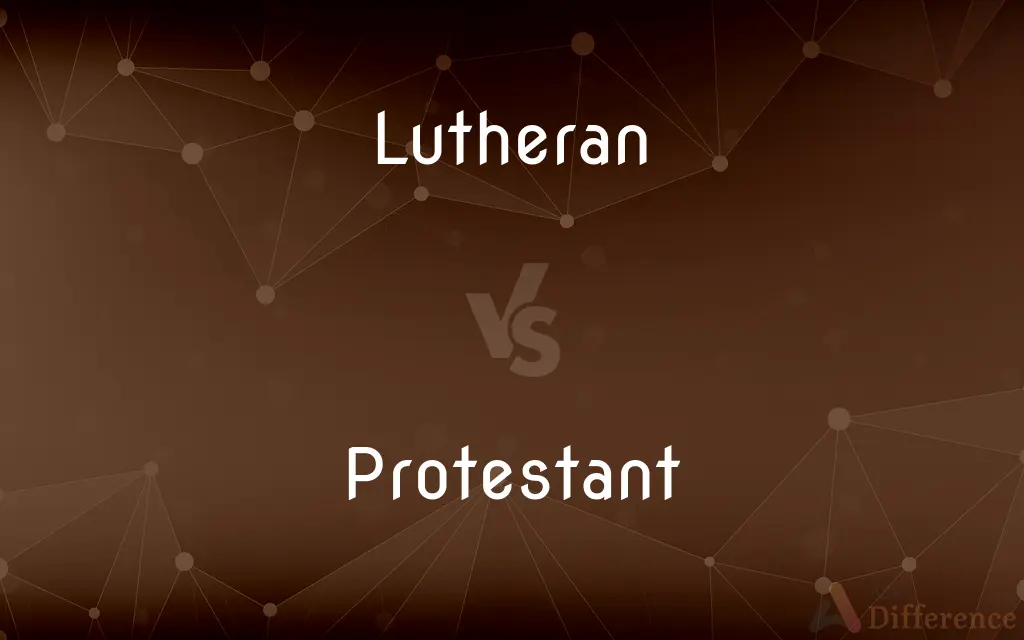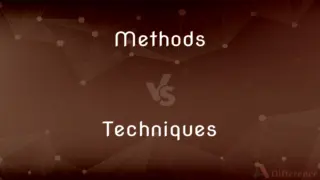Lutheran vs. Protestant — What's the Difference?
Edited by Tayyaba Rehman — By Fiza Rafique — Updated on April 16, 2024
Lutheran practices are a subset of Protestantism, emphasizing justification by faith alone, while Protestantism broadly rejects Catholic doctrines and rituals.

Difference Between Lutheran and Protestant
Table of Contents
ADVERTISEMENT
Key Differences
Lutheranism stems directly from the teachings of Martin Luther, which initiated the Protestant Reformation in the 16th century. Protestantism, however, encompasses all Christian denominations that diverged from the Roman Catholic Church during and after the Reformation.
Lutheran churches typically maintain traditional liturgical worship that closely resembles Catholic rituals, whereas Protestant churches can range from very liturgical to very non-liturgical, reflecting a broader diversity of worship styles.
In Lutheran theology, a key doctrine is justification by faith alone, a belief that faith in Christ is sufficient for salvation. Other Protestant denominations may share this belief but often couple it with varying emphases on scripture, grace, or predestination.
Lutherans retain a strong sacramental orientation, highly valuing the Eucharist and baptism as means of grace. Other Protestant groups might view these sacraments more symbolically and place less emphasis on their sacramental nature.
Governance in Lutheran churches often involves a synodal structure, blending hierarchical and democratic elements. Protestant denominations can exhibit a wide range of governance structures, from tightly controlled hierarchies to completely independent local congregations.
ADVERTISEMENT
Comparison Chart
Origin
Initiated by Martin Luther, 16th century
Broader movement starting in the 16th century
Worship Style
Liturgical, similar to Catholic
Ranges from liturgical to non-liturgical
Key Doctrine
Justification by faith alone
Varied, generally includes scripture primacy
Sacraments
High emphasis, especially Eucharist and baptism
Generally symbolic, varies by denomination
Governance
Synodal, combining democratic and hierarchical elements
Varies from hierarchical to congregational
Compare with Definitions
Lutheran
A member of a Protestant church following the theological beliefs and church practices initiated by Martin Luther.
Lutherans commonly celebrate the Eucharist at their services.
Protestant
Pertaining to the Christian churches that are not aligned with the Pope or Catholic tradition.
Protestant denominations vary widely in their worship practices.
Lutheran
Relating to the doctrines or practices of Lutheran churches.
The Lutheran emphasis on liturgy distinguishes it from many other Protestant denominations.
Protestant
A member of any of the churches that separated from the Roman Catholic Church during the Reformation.
Protestants often emphasize personal reading and interpretation of the Bible.
Lutheran
A branch of Christianity that broke away from Roman Catholicism in the early 16th century.
The Lutheran Church originated in Germany.
Protestant
Encompassing a movement within Christianity advocating for a return to the scriptures.
Protestant reformers advocated for translations of the Bible into vernacular languages.
Lutheran
Adhering to the belief in justification by faith alone.
Lutheran theology strongly opposes the notion of earning salvation through good works.
Protestant
Characterized by the rejection of the papal authority and Catholic doctrines.
Protestant teachings generally dismiss the necessity of confession to priests.
Lutheran
Pertaining to the ecclesiastical governance and liturgical traditions established by Luther.
Lutheran churches often feature a synodal governance structure.
Protestant
Describing a diversity of beliefs and practices grouped under the umbrella of Reformation-based Christianity.
Protestant churches include Baptist, Methodist, and Presbyterian among others.
Lutheran
Of or relating to the religious doctrines of Martin Luther, especially the doctrine of justification by faith alone.
Protestant
A member of a Western Christian church whose faith and practice are founded on the principles of the Reformation, especially in the acceptance of the Bible as the sole source of revelation, in justification by faith alone, and in the universal priesthood of all the believers.
Lutheran
Of or relating to the Protestant denomination adhering to these doctrines.
Protestant
A member of a Western Christian church adhering to the theologies of Luther, Calvin, or Zwingli.
Lutheran
A member of the Lutheran Church.
Protestant
One of the German princes or cities that supported the doctrines of Luther and protested against the decision of the second Diet of Speyer (1529) to enforce the Edict of Worms (1521) and deny toleration to Lutherans.
Lutheran
Of or pertaining to Luther; adhering to the doctrines of Luther or the Lutheran Church.
Protestant
Protestant (also prə-tĕstənt) One who makes a declaration or avowal.
Lutheran
One who accepts or adheres to the doctrines of Luther or the Lutheran Church.
Protestant
Of or relating to Protestants or Protestantism.
Lutheran
Follower of Lutheranism
Protestant
Alternative case form of Protestant
A protestant effort
Protestant work ethic
Lutheran
Of or pertaining to Martin Luther or his teachings;
The Lutheran doctrine of justification by faith alone
Protestant
Protesting.
Lutheran
Of or pertaining to or characteristic of the branch of the Protestant Church adhering to the views of Luther;
Lutheran doctrines
Protestant
One who protests; a protester.
Protestant
Alternative case form of Protestant
Protestant
One who protests; - originally applied to those who adhered to Luther, and protested against, or made a solemn declaration of dissent from, a decree of the Emperor Charles V. and the Diet of Spires, in 1529, against the Reformers, and appealed to a general council; - now used in a popular sense to designate any Christian who does not belong to the Roman Catholic or the Greek Church.
Protestant
Making a protest; protesting.
Protestant
Of or pertaining to the faith and practice of those Christians who reject the authority of the Roman Catholic Church; as, Protestant writers.
Protestant
An adherent of Protestantism
Protestant
The Protestant churches and denominations collectively
Protestant
Of or relating to Protestants or Protestantism;
Protestant churches
A Protestant denomination
Protestant
Making a protest
Common Curiosities
What governance structures are common in Lutheran and other Protestant churches?
Lutherans often use a synodal structure, while other Protestant churches can range from hierarchical to completely congregational.
Can Lutherans be considered Protestants?
Yes, Lutherans are a subset of Protestants, originating from the broader Protestant Reformation.
What are typical worship practices in Lutheran churches compared to other Protestant churches?
Lutheran worship is typically more liturgical and similar to Catholic rituals, while Protestant worship can vary from very traditional to very contemporary.
How do Lutheran and Protestant views on sacraments differ?
Lutherans view sacraments as means of grace and essential to salvation, whereas other Protestants may see them more symbolically.
What role does tradition play in Lutheran versus other Protestant denominations?
Tradition holds a significant place in Lutheran practice, often mirroring Catholic traditions, whereas many other Protestant denominations prioritize scripture over traditional practices.
Do Lutheran churches have bishops?
Yes, many Lutheran denominations retain a hierarchical structure with bishops, unlike some Protestant denominations that operate with more congregational autonomy.
How does the concept of predestination differ between Lutherans and other Protestants?
Lutherans generally reject strict predestination, focusing instead on universal grace through faith, while some Protestant denominations, like Calvinists, strongly adhere to the doctrine of predestination.
What is the Lutheran stance on confession compared to other Protestant groups?
Lutherans practice confession in a manner somewhat similar to Catholics, viewing it as sacramental, whereas many other Protestant groups treat confession as a personal, non-sacramental act between the individual and God.
What is the significance of church creeds in Lutheran and other Protestant denominations?
Lutherans typically adhere closely to early Christian creeds, such as the Apostles' Creed and the Nicene Creed, as doctrinal foundations. Other Protestant denominations may also use these creeds but often with less emphasis on their liturgical importance.
How do Lutherans and Protestants differ in their celebration of religious holidays?
Lutherans tend to follow the traditional liturgical calendar closely, which includes holidays like Lent and Advent, similar to Catholics. In contrast, some Protestant denominations may not observe these seasons as strictly.
What is the main theological difference between Lutheran and other Protestant churches?
Lutherans uniquely emphasize justification by faith alone, while other Protestant denominations might also stress scripture, grace, or predestination.
How do Lutherans and other Protestants view the authority of the Bible?
Both Lutherans and other Protestants hold the Bible as the ultimate authority in matters of faith and practice, but Lutherans particularly emphasize the justifications for beliefs found in the New Testament.
What historical figure is most associated with the start of the Lutheran Church?
Martin Luther is the key figure in the founding of the Lutheran Church, sparking the Reformation with his 95 Theses in 1517.
What are the views on ecumenism among Lutherans and other Protestant denominations?
Lutherans generally participate in ecumenical movements with other Christian denominations, although with a cautious approach to theological alignment. Other Protestant denominations vary widely in their enthusiasm and participation in ecumenical efforts, from very active to more isolated.
How does church music differ between Lutheran and other Protestant churches?
Lutheran worship often includes traditional hymns and chorales, many written by Luther himself, emphasizing formal music settings. Other Protestant churches might feature a broader range of music styles, from gospel to contemporary worship music.
Share Your Discovery

Previous Comparison
Dynasty vs. Empire
Next Comparison
Methods vs. TechniquesAuthor Spotlight
Written by
Fiza RafiqueFiza Rafique is a skilled content writer at AskDifference.com, where she meticulously refines and enhances written pieces. Drawing from her vast editorial expertise, Fiza ensures clarity, accuracy, and precision in every article. Passionate about language, she continually seeks to elevate the quality of content for readers worldwide.
Edited by
Tayyaba RehmanTayyaba Rehman is a distinguished writer, currently serving as a primary contributor to askdifference.com. As a researcher in semantics and etymology, Tayyaba's passion for the complexity of languages and their distinctions has found a perfect home on the platform. Tayyaba delves into the intricacies of language, distinguishing between commonly confused words and phrases, thereby providing clarity for readers worldwide.














































